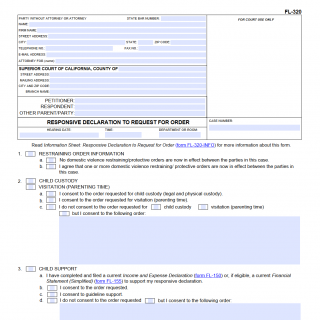FL-320. Responsive Declaration to Request for Order
FL-320 is a legal form known as the Responsive Declaration to Request for Order. It is used in California family law court cases to respond to a Request for Order filed by the other party. The form is an essential document that enables the responding party to set forth their arguments and evidence to dispute the allegations and requests made by the other party.
The FL-320 form consists of several parts, including a caption, a statement of facts, a response to the court's order, and a declaration. The caption includes the case number, the name of the court, and the names of the parties involved. The statement of facts is where the responding party provides a detailed response to the allegations made by the other party. The response to the court's order section is where the responding party responds to any orders that the court has made, and the declaration section is where the responding party swears under oath that the information provided in the form is true and accurate.
Some of the important fields in the FL-320 form include the case number, the names of the parties, the date of the filing, and the date of the hearing. It is crucial to ensure that all the information provided in the form is accurate and up-to-date, as any discrepancies could result in the form being rejected by the court.
The FL-320 form is commonly used in family law cases such as child custody, child support, and spousal support. It is important to note that this form is not a standalone document and must be filed in conjunction with other legal documents.
When compiling the FL-320 form, it is crucial to provide as much evidence and detail as possible to support your arguments. This could include witness statements, financial documents, and other relevant evidence. By doing so, the responding party can increase their chances of having their requests granted by the court.
One of the benefits of using the FL-320 form is that it provides a structured framework for responding to a Request for Order. This can help the responding party to organize their thoughts and arguments in a clear and concise manner, which can increase their chances of success in court.
However, there are also some risks associated with using the FL-320 form. If the responding party does not provide sufficient evidence or fails to address the allegations made by the other party, they could risk having their requests denied by the court.
Some related forms to the FL-320 include the FL-300 (Request for Order), FL-305 (Temporary Emergency (Ex Parte) Orders), and FL-311 (Child Custody and Visitation Order Attachment). Analogues to this form can include similar legal forms used in other states or jurisdictions.
The FL-320 form can have a significant impact on the future of the parties involved in a family law case. The outcome of the case can affect child custody arrangements, child support payments, and other important issues. Therefore, it is crucial to take the form seriously and provide accurate and detailed information.
Once completed, the FL-320 form must be filed with the court and served on the other party. The form is typically stored in the court's records and can be accessed by the parties involved in the case and their legal representatives.

